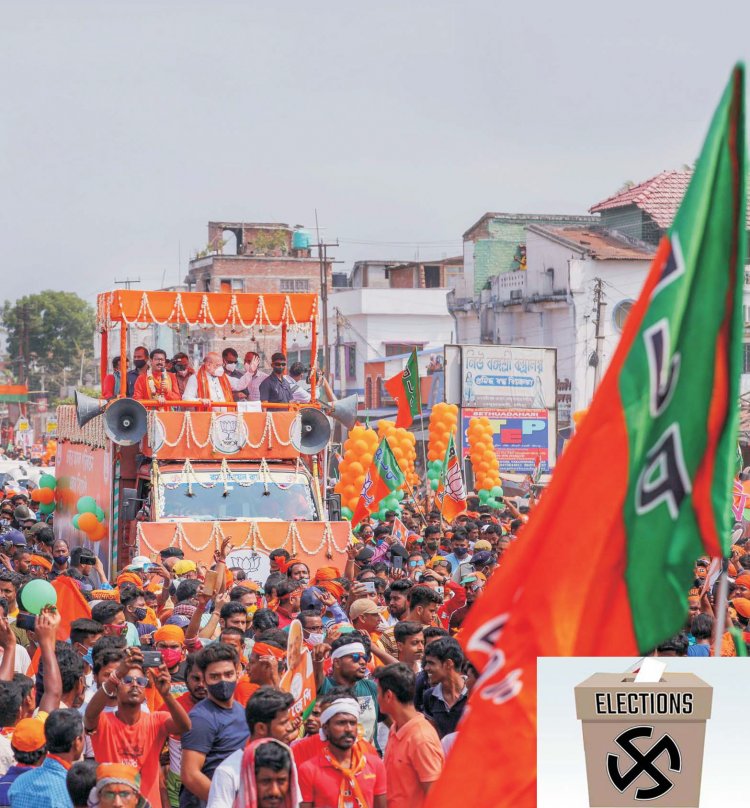BJP’s Summer of Discontent
Amulya Ganguli

It’s been a bad week for the BJP and personally for the prime minister. Not only has Narendra Modi been roundly excoriated by the Western media for the Covid crisis in India for failing to first assess and then tackle the situation, his party has faced a comprehensive electoral defeat in West Bengal, belying grandiose predictions of winning 200-plus seats in the 294-seat state legislature.
The BJP has also lost in Tamil Nadu and Kerala. But it was never a major competitor in these two southern states. However, the party had apparently set its heart on winning West Bengal, based on its creditable showing in the last parliamentary elections and banking on the ruling Trinamool Congress under chief minister Mamata Banerjee falling prey to the anti-incumbency factor after a decade in office.
In the event, although Mamata lost her own seat in Nandigram, it was Trinamool which crossed the 200-plus mark to hand the BJP a humiliating defeat and remind it that an assembly election is different from a parliamentary one with local issues playing a crucial part. Among the issues which seem to have undermined the BJP’s chances is the party lack of familiarity with Bengali history and culture. As a party of Hindi speakers whose original base is in north India, the BJP’s language and outlook are markedly different from those of the average Bengali.
This may have been one of the reasons why the party’s organizational spread was weak in West Bengal compared to what it is in, say, U.P. and why it could not project a chief ministerial face although it gave the assurance that the person will be a son or daughter of the soil. In contrast, Mamata presented herself as a daughter of Bengal and warned the people against outsiders who thought that Rabindranath Tagore’s birthplace was Shantiniketan ! She also lived up to her reputation as a street fighter who had routed the once formidable Left a decade ago and was ready to take on the new challenger.
Although the BJP succeeded in luring away scores from the Trinamool Congress to try and give the impression that the ground was slipping from under Mamata’s feet, she didn’t lose her nerve and campaigned gamely with a bandaged leg which was injured in an accident. Now, with the proud record of having defeated both the Left and the Right, she stands on the verge of perhaps playing a pivotal role in national politics. Her chances in this respect have brightened because of the dismal performance of the Congress, which lost in West Bengal, Assam and Puducherry and came second in Tamil Nadu and Kerala.
What these setbacks for the Congress mean is that Rahul Gandhi has lost his place as a possible leader of an opposition alliance at the national level, a position which can lead one to be the prime minister. Instead of him, Mamata can be said to have emerged as a possible candidate in view of her massive victory over the Narendra Modi-Amit Shah combine. It is a feat which none of the others, whether it is the DMK’s M.K. Stalin in Tamil Nadu or the CPI(M)’s Pinarayi Vijayan in Kerala, has been able to accomplish if only because the BJP is a virtual nonentity in their states.
If Mamata does emerge as a front-runner in the prime ministerial stakes for the national opposition, she will be in a direct face-off with Modi in 2024 if the prime minister is able to weather the current storm over the government’s mismanagent of the Covid crisis. Unless the number of cases and the death toll begins to show a downward trend, the BJP will face a tough challenge in next year’s assembly elections in U.P., Uttarakhand, Himachal Pradesh, Goa, Gujarat, Punjab and Manipur. As long as there is a shortage of hospital beds, oxygen and vaccines, the BJP cannot be expected to do well. And even if conditions improve, it can still be held accountable for having failed to deal with the second wave and letting hundreds die.
The BJP’s defeats in West Bengal, Tamil Nadu and Kerala show that the Modi magic which swept the party to power in the 2019 parliamentary elections has begun to fade. It won in Assam and Puducherry, but these elections were held before the devastating second wave or tsunami, as it has also been called, of Covid-19 hit the nation, exposing the government’s fallibility. This is true of the three other states as well, but the BJP was never a strong player in these, notwithstanding the gains it made in West Bengal in 2019 which have now proved to be ephemeral.
What the West Bengal, Tamil Nadu and Kerala results show is that there is light at the end of the tunnel for the national opposition. Its belief that there’s no stopping the BJP, and the BJP’s own conviction, as articulated by Amit Shah, that it would rule from panchayats to parliament for the next 50 years, may well prove to be erroneous.
Instead, there is every possibility that the BJP will lose several of the 2022 state assembly elections and see a reduction of its parliamentary strength in 2024. If the opposition can get its act together by forming a credible mahagathbandhan (grand alliance), the BJP can even be made to taste defeat at the national level.
But all that is in the future. For the present, the successful parties of the latest election can informally begin consultations with anti-BJP outfits like the Congress, the Nationalist Congress Party, the DMK, the Left, the Shiv Sena, the Jharkhand Mukti Morcha and others to prepare the ground for taking on the BJP.
















